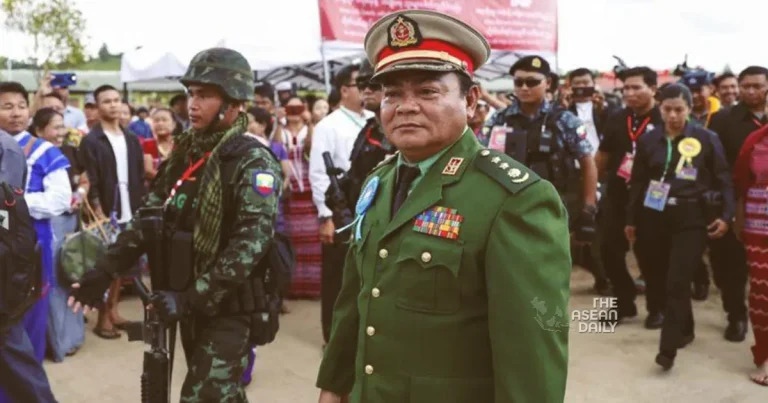25-4-2024 (YANGON) Amidst the escalating conflict in Myanmar, the border town of Myawaddy has emerged as a pivotal battleground, where the struggle for control has brought to light the outsized influence of a renegade warlord and his militia. Armed soldiers loyal to Colonel Saw Chit Thu, the turncoat leader, patrol the streets of this outpost, which handles over $1 billion in cross-border trade each year.
The tussle for Myawaddy has underscored the role played by Saw Chit Thu, his Karen National Army (KNA) militia, and their sprawling business enterprises, highlighting the warlord’s sway in this strategically vital territory. The KNA has long maintained a presence in the region, which lies across from Thailand’s Tak province, an area that has recently become a key battleground as the anti-junta resistance gains momentum against Myanmar’s powerful military.
Saw Chit Thu’s ties to the ruling junta have been strengthened by the honorary title of “outstanding performance” conferred upon him by junta chief Gen Min Aung Hlaing in November 2022. However, Britain has imposed sanctions on him for grave human rights violations, including people-trafficking, and analysts have raised concerns over his links to border scam centres run by Chinese-led crime networks.
In early April, Myawaddy became the frontline as resistance fighters led by the Karen National Union (KNU), one of the country’s oldest ethnic armies, pushed into the area and dislodged hundreds of junta troops from their bases. Surprisingly, the KNA, once entirely loyal to the junta, stood aside after Saw Chit Thu declared that the militia, formerly known as the Border Guard Force (BGF), would cease accepting salaries and rations from the military.
“We do not want to fight among our Karen people,” Saw Chit Thu told the media in January, highlighting the complex dynamics at play.
The United States Institute of Peace (USIP) noted in a recent report that the lack of logistical and tactical support from the KNA, estimated to have a strength of about 8,000 soldiers, hindered the junta’s ability to fight back in Myawaddy, leading to another battlefield defeat for the military.
However, the KNA’s status as being neither entirely loyal to the junta nor pledging allegiance to the rebels has thrust it into the spotlight. The military, which retains significant firepower, has mounted a counteroffensive for the town, forcing a temporary withdrawal of KNU resistance forces, some moving about 12 kilometres away to control key routes, according to Saw Taw Nee, the KNU’s spokesman.
Saw Taw Nee added that the support of Saw Chit Thu’s KNA militia enabled the return of some junta troops to Myawaddy. Other sources suggest that the warlord switched sides again after Myanmar military commanders warned that his businesses would be bombed from the air if he did not comply.
On Thursday, small groups of KNA soldiers drove through the town of about 200,000 people, which remains peaceful, as residents reported that government offices were open and the town was functioning normally.
However, Saw Chit Thu’s empire extends far beyond the military sphere. His militia emerged around 2010 from a faction of the armed wing of the KNU, siding with Myanmar’s military to take on their opponents, including the KNU and its military wing, the Karen National Liberation Army (KNLA), in parts of the southeastern highlands, mainly home to the Karen ethnic group.
By 2017, the warlord became involved in the construction of Shwe Kokko, a so-called Special Economic Zone along the Thai-Myanmar border. The project has since become a centre for transnational crime and gambling backed by Chinese-origin gangs, earning the KNA around £150 million a year, according to analysts.
Britain sanctioned Saw Chit Thu late last year for “serious violations of human rights,” accusing him of involvement in “trafficking of individuals” who were taken to Shwe Kokko and forced to work as scammers, subjected to cruel, inhuman, and degrading treatment or punishment.
As Chinese authorities have cracked down on scam compounds along the border with Myanmar, some criminal syndicates have relocated to the Thai-Myanmar border, including areas controlled by Saw Chit Thu, according to the USIP. “The dozens of scam centres established in Karen State by Chinese-led crime networks have grown visibly along the Thai border since the compounds on the Chinese frontier shut down,” the think-tank stated in its April report.
“Chit Thu has remained focused on reinforcing his crime empire and ensuring that it retains access to key support services, such as security, communications connectivity and electricity.”




